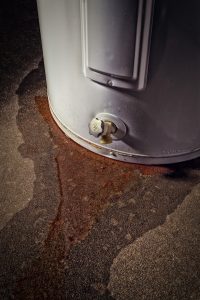You never want to see rust or other types of corrosion appearing on important metal appliances or fixtures. It’s bad news because corrosion weakens metal and eventually causes it to deteriorate and flake away.
Because a water heater is a mostly metal device that holds and circulates water, it’s in jeopardy of rusting. Thankfully, water heaters have special defenses built into them to prevent rust and other types of corrosion from getting an early hold on them. These defenses include the sacrificial anode rod that attracts rust to it rather than the tank; the expansion tank that keeps oxygen out of the main tank (corrosion requires oxygen to trigger the chemical reaction between water and metal); and a glass lining inside the tank.
Yet seeing that your water heater has rust on the outside can still happen. When you see rust on your home’s water heater, does this mean the water heater is finished? Is it time to call us for a water heater replacement?
In most cases, yes, a rusted water heater needs to be replaced
The bad news first: if you notice rust or other types of corrosion forming on the tank of your water heater, then it’s time to call our technicians to see about replacing the unit. If you notice a reddish discoloration coming from the hot water taps around your home (not just at one faucet), this is one of the major signs of a water heater that’s finished. This discoloration means the tank has already rusted through.
Something to keep in mind that may make the decision to replace the rusted water heater easier: if a water heater receives proper annual maintenance (which includes changing the anode rod whenever it rusts through), corrosion will not start until the water heater is at an advanced age, such as around 20 years. In this case, the rust is just the ticking-clock for water heater replacement—the major sign that the water heater is too old and probably should’ve been replaced a few years early. You’ve gotten the years you wanted from your water heater and it’s time to move to the next one.
There are exceptions
Yes, in some situations, rust on a water heater isn’t the end. There are parts of the water heater you can have replaced if they show signs of rust.
One of these is the heat exchanger. This is the part of a gas-powered water heater where the hot combustion gas from the burners transfers into the bottom of the tank to heat the water. Heat exchangers can rust because of reactions between combustion vapor and the metal of the exchanger. If this corrosion hasn’t gotten to the tank, you can have the exchanger replaced. We recommend speaking to our technicians about the cost-effectiveness of taking this route, as the heat exchanger replacement might be too expensive compared to installing a new water heater.
You might see rust on the top of the tank because of leaking connections. In this situation, fixing the leak and then having the rust removed may be enough to spare the rest of the water heater—provided you get professionals on the job soon enough. Definitely don’t delay when you see rust appearing anywhere.
Contact Purl’s Sheet Metal & Air Conditioning for water heater service. Uncompromised Quality & Customer Service Since 1952.


